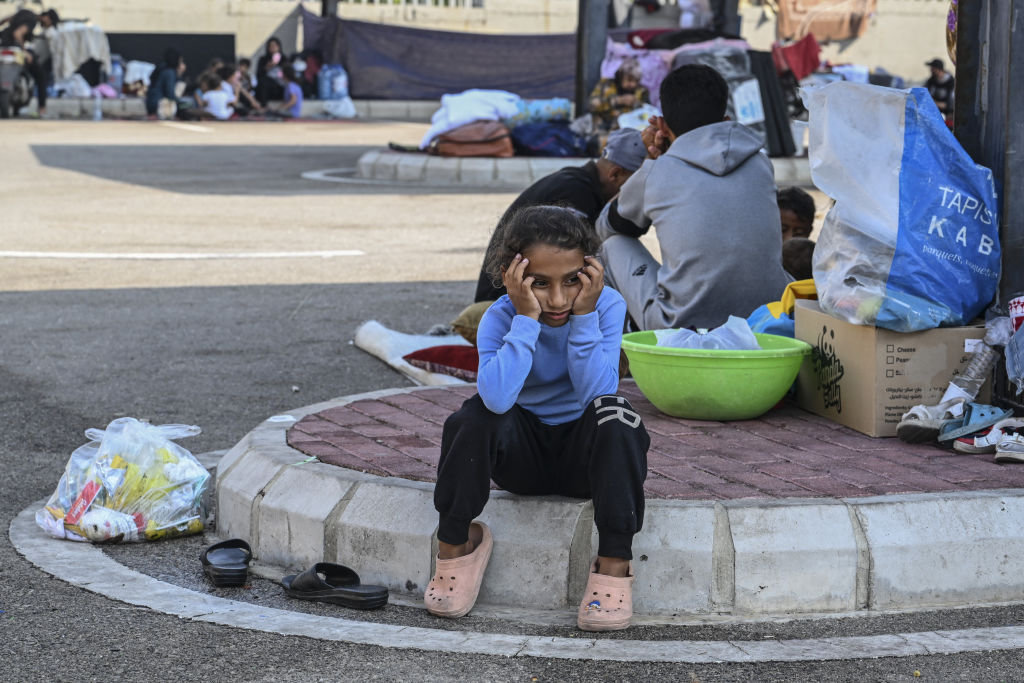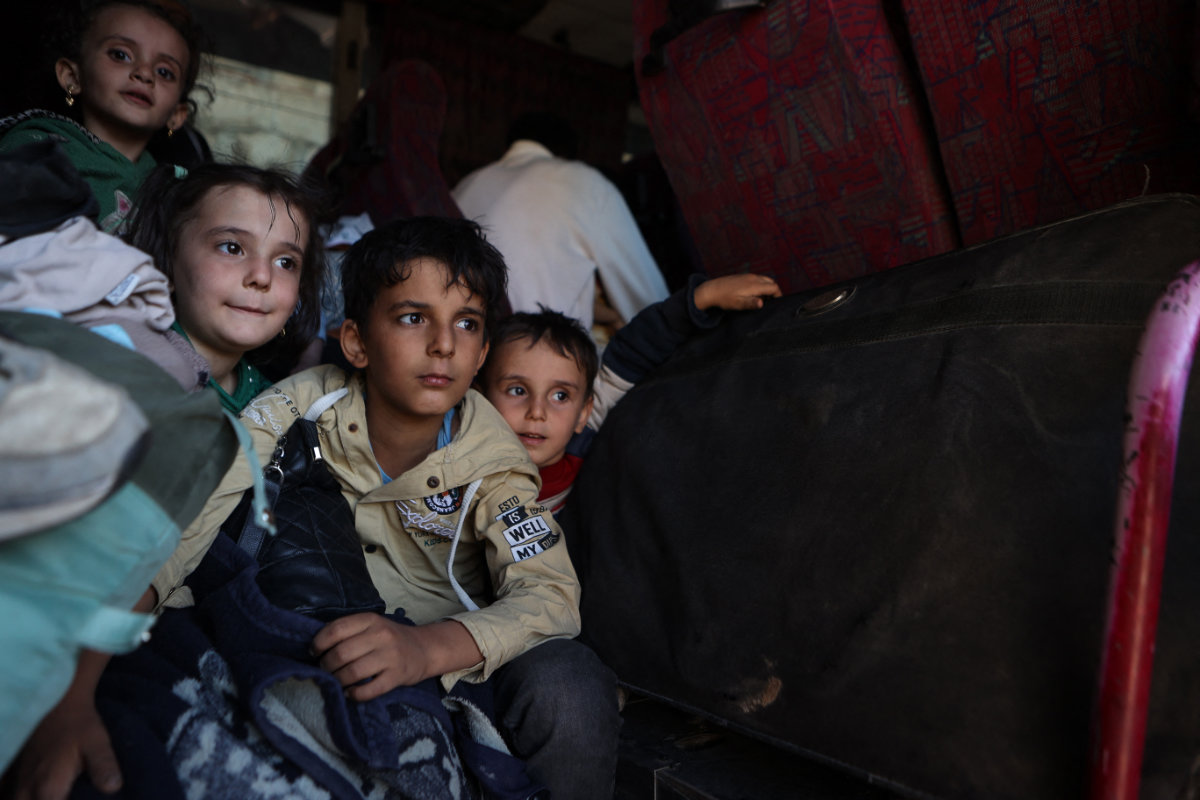LONDON: Syrians displaced to Lebanon by the civil war in their home country have found themselves on the move once again, as Israel’s targeting of the Iran-backed Lebanese Hezbollah militia has forced more than a million people from their homes.
Many Syrians, unable to return home for fear of conscription or arrest, face a difficult dilemma — whether to ride out the conflict in Lebanon, despite deepening poverty and mounting hostility, or even risk the irregular sea crossing to Cyprus or beyond.
Hezbollah and the Israeli military have been trading blows along the Lebanese border since Oct. 8, 2023, when the militia began rocketing northern Israel in solidarity with Hamas, its Palestinian militia ally, which had just attacked southern Israel, sparking the Gaza war.
However, in September this year, the Israeli military suddenly ramped up its attacks on Hezbollah positions across Lebanon, disrupting its communications network, destroying arms caches, and eliminating much of its senior leadership.
Israeli jets have pounded Hezbollah positions in towns and villages across southern Lebanon and its strongholds in the suburbs of the capital, Beirut, while ground forces have mounted “limited” incursions into Lebanese territory.
More than 1.2 million people have been displaced since the hostilities began more than a year ago, according to UN figures. Among them, the UN Refugee Agency, UNHCR, has identified 34,000 Syrians who have been secondarily displaced since October 2023.
For Lebanese civilians, the conflict has revived grim memories of the devastating 2006 war with Israel and the civil war years of 1975-90. For Syrians, though, the memories of conflict and displacement are even more raw, with the 13-year civil war in their home country still ongoing.

A picture shows smoke billowing from a tissue factory after an overnight Israeli strike on the Lebanese city of Baalbeck in the Bekaa valley on October 11, 2024. (AFP)
Hezbollah fighters from Lebanon took part in the Syrian civil war, which began in 2011, on the side of the Bashar Assad regime against armed opposition groups, thereby contributing to the mass displacement of Syrians that followed.
“Refugees who have fled their homeland in search of safety and security are now facing the reality of being displaced once again in Lebanon due to ongoing hostilities,” Lisa Abou Khaled, a UNHCR spokesperson, told Arab News.
“This double displacement exacerbates their vulnerability.”
UNHCR reported that more than 400,000 people, at least 70 percent of them Syrians, have crossed the border into Syria to escape the escalating violence in Lebanon. However, for many, returning home is not an option.

Rescue workers remove rubble, as they search for victims at the site that was hit by Israeli airstrikes in Qana village, south Lebanon, on Oct. 16, 2024. (AP)
The alternative is to remain in Lebanon, where Syrians have reportedly been denied access to work, housing, and services amid the country’s economic crisis, and mounting hostility from Lebanese citizens who believe their own needs have been overlooked.
Rabab, whose name has been changed to protect her identity, spent several nights sleeping rough in Sidon’s Martyrs’ Square last month before locals offered her and her husband a place to stay.
“When we visited the municipality, they refused to register our names and said priority was given to displaced Lebanese families,” Rabab, who is originally from northwest Syria, told Arab News.
“Returning to Syria now is out of the question as I have no family left there, and my husband will face conscription.”
INNUMBERS
• 1.2 million: People displaced by conflict in Lebanon since October 2023.
• 34,000: Syrians in Lebanon who have been secondarily displaced.
• 400,000: Displaced people, 70 percent of them Syrians, who have fled to Syria.
(Source: UNHCR)
The result has been a growing number of Syrian families displaced from southern Lebanon sleeping rough on the streets of Sidon and other cities, with the buzz of Israeli drones and jets overhead and winter temperatures fast approaching.
“Many displaced Syrians in Lebanon, particularly those newly displaced due to recent escalations, face significant challenges in accessing shelters,” Tania Baban, the Lebanon country director of the US-based charity MedGlobal, told Arab News.
Recounting an incident in Sidon, where displaced Syrians had been turned away “due to a lack of shelter capacity,” Baban said: “Municipalities in regions have implemented restrictions, often barring entry to Syrian displaced people, citing overcrowding or security concerns.

Syrian children, who had to fled their country after the outbreak of the war in Syria in 2011 and migrated to Lebanon, are seen in an area where refugees live in Sidon city of Lebanon on October 7, 2024. (Anadolu via Getty Images)
“As a result, some families are sleeping in informal makeshift camps, abandoned buildings, or even out in the open parking lots in Sidon,” she added, stressing that the situation is particularly dire in areas like the capital, Beirut, which was already overpopulated prior to the escalation.
Hector Hajjar, Lebanon’s caretaker minister of social affairs, has denied accusations of discrimination against displaced Syrians. According to Lebanon’s National News Agency, Hajjar said earlier this month that his government was committed to safeguarding all affected groups.
Stressing that “UNHCR appreciates Lebanon’s generous hospitality in hosting so many refugees and understands the challenges this adds at this very delicate juncture,” the UN agency’s spokesperson Abou Khaled called on “all actors to maintain and apply humanitarian principles and allow equal access to assistance.”
“Newly displaced Syrians and Lebanese in several regions tell us that they have had to sleep in the open,” she said, adding that “UNHCR and partners are working with the relevant authorities on finding urgent solutions to this issue.”
Lebanon has the most refugees per capita in the world, hosting some 1.5 million Syrians prior to the current escalation, according to government estimates.

Zaher Sahloul, president of MedGlobal, called on humanitarian agencies to “act swiftly to provide the protection and support these refugees urgently need.”
“Every person, regardless of nationality, deserves to be treated with dignity and compassion during this crisis,” he said in a statement in late September.
Unfortunately, this has not been the case for many Syrians in Lebanon.
Footage has emerged on social media showing the purported abuse of Syrians. In one such video, a man was seen tied to a post on a city street while the person filming claims this was done because people in Syria’s Idlib had celebrated the death of Hezbollah chief Hassan Nasrallah.
Meanwhile, some Lebanese politicians have seized upon the worsening situation in Lebanon to advance an anti-Syrian agenda, insisting Syria is now safe for them to return.

Syrian Red Crescent rescuers attend to displaced people arriving from Lebanon at the Jdeidat Yabus border crossing in southwestern Syria on October 7, 2024. (AFP)
Last month, Bachir Khodr, the governor of Baalbek-Hermel, told Al-Jadeed TV that “the reason for the Syrians’ presence is the war in Syria. This war has ended, so they must now leave Lebanon, as the war is here now.”
Lebanon has endured a crippling economic crisis since 2019, which has plunged much of the population into poverty. In recent years, Lebanese politicians have characterized displaced Syrians as a burden on society and called for their deportation.
Despite human rights organizations unanimously agreeing in May that no part of Syria is safe for returnees, a UNHCR report in March highlighted that 13,772 Syrians had been deported from Lebanon or pushed back at the border with Syria in about 300 incidents in 2023.

Children sit in a bus as Syrians who were refugees in Lebanon return to their home country after a five-day journey to the northern Idlib province where they are received at a temporary resting point in the town of Qah, on October 4, 2024. (AFP)
Human Rights Watch also reported in April that Lebanese authorities “have arbitrarily detained, tortured, and forcibly returned Syrians to Syria,” including activists and army defectors.
Disputing the findings, Khodr, the governor of Baalbek-Hermel, argued that the return of some “235,000 displaced Syrians” to their country “challenges the theory that the Syrian authorities might arrest those returning to it.”
“We have repeatedly said that the Syrian side has not harassed any of its citizens who have returned since the start of the voluntary return campaigns in 2018, but rather they have been treated in the best possible way,” Khodr posted on the social platform X on Oct. 8.
However, the UK-based Syrian Network for Human Rights reported that Syrian authorities have arrested 23 individuals who had returned from Lebanon since September.

Syrians who were refugees in Lebanon return to their home country after a journey to the opposition held northern Idlib province through the crossing Aoun al-Dadat north of Manbij, on October 9, 2024. Lebanon became home to hundreds of thousands of Syrians after the repression of anti-government protests in Syria in 2011 sparked a war that has since killed more than half a million people. (AFP)
For those Syrians who have chosen to remain in Lebanon, despite its many challenges, assistance provided by humanitarian aid agencies has become a vital lifeline.
Abou Khaled of UNHCR said her agency “is working relentlessly with humanitarian partners and Lebanese authorities to urgently find safe shelter for those without any.”
“A comprehensive emergency shelter strategy has been shared with proposed shelter solutions in all Lebanese regions and work is ongoing at the cadastre and district levels to implement parts of it.”
She added: “Current hostilities, compounded by the ongoing socio-economic situation, create challenges for all communities, all of whom deserve equal access to safety and dignity.”








